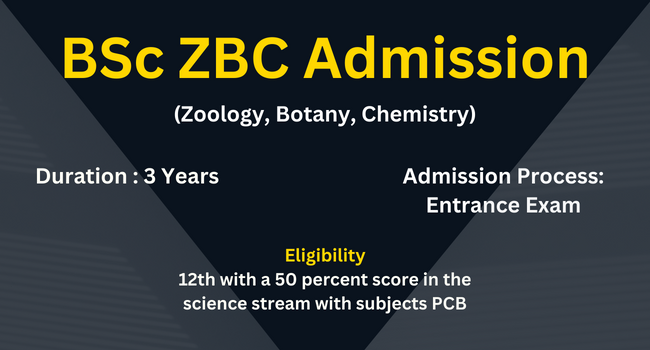BSc ZBC Admission 2024: B.Sc. in ZBC (Zoology, Botany, and Chemistry) is a three-year course designed for students who want to study animals, plants, and chemicals. After completing 10+2, students can apply for this program to learn about the natural world. It combines classroom learning with lab work to help students understand how living things work and interact. This course opens doors to careers in research, conservation, education, and more.
To join the B.Sc. ZBC program, students must have completed 10+2 with at least 50% marks from a recognized board. The course teaches students about animals, plants, and chemistry. The fees for the program usually range from ₹15,000 to ₹1,50,000. With this degree, students can explore many job opportunities in fields like environmental science, pharmaceuticals, and education. To apply, visit the university’s official website, fill out the application form, and submit the required documents. Career prospects include roles in research, teaching, and biotechnology.
BSc ZBC Admission Important Points:
- Course Full Name: Bachelor of Science in Zoology, Botany, and Chemistry (BSc ZBC)
- About: The BSc ZBC program is an undergraduate course that covers Zoology, Botany, and Chemistry. This course is designed to give students a strong foundation in these three key science subjects. It combines classroom learning with hands-on practical work, making it ideal for those interested in research, teaching, or environmental science.
- Eligibility Criteria: Students must have completed their 10+2 education in the Science stream with 50% marks. Some universities also accept admission on the basis of passing marks in the 12th exam.
- Program Duration: It requires a total of 3 years in completing the course.
- Course Curriculum: The course covers subjects like Plant Biology, Ecology, Biotechnology, Study of Animals, Genetics, Physiology, Organic, Inorganic, and Physical Chemistry, including lab work.
- Career Opportunities: After completing this bachelor level course, you can find jobs as Lab Technicians, Research Scientists, Environmental Consultants, or Teachers.
- Average Salary: Starting salary varies by INR 3.5 LPA to INR 8.5 LPA, according to experience.
- Approx. Fees: The annual fees for this BSc program range from INR 15,000 to INR 1,50,000.
BSc ZBC Admission Highlights
| Course Name | BSc ZBC |
| Full Form | Bachelor of Science in Zoology, Botany, and Chemistry |
| Eligibility | 10+2 with a minimum of 50% in Science stream |
| Duration | 3 years |
| Average Course Fees | Rs. 15,000 to Rs. 1.5 lakh per year |
| Entrance Exams | University-specific exams or merit-based |
| University Name | IMTS Institute |
| Subjects | Zoology, Botany, Chemistry |
| Program Level | Undergraduate |
| Minimum Percentage Required | 50% in 12th grade (Science) |
| Study Mode | Full-time, Distance learning |
| Age Limit | Typically 17 years and above |
| Job Roles | Lab Technician, Wildlife Biologist, Ecologist, Environmental Consultant |
| Average Salary Offered | ₹2.5 – ₹5 LPA |
What is BSc ZBC?
BSc ZBC (Zoology, Botany, Chemistry) is a comprehensive undergraduate program that combines the study of animal biology, plant biology, and chemical sciences. This rigorous 3-year course provides students with a strong foundation in these core scientific disciplines. Key areas of study include:
- Zoology: Animal anatomy, physiology, behavior, ecology, and evolution
- Botany: Plant structure, function, diversity, ecology, and biotechnology
- Chemistry: Organic, inorganic, physical, and analytical chemistry
By pursuing a BSc ZBC degree, students develop a deep understanding of living organisms and the chemical processes that underpin life. The program equips students with practical laboratory skills, scientific reasoning abilities, and research experience, preparing them for diverse careers in the life sciences.
Why Choose BSc ZBC?
BSc ZBC offers a multidisciplinary approach to studying life and its chemical basis. Here are the key benefits of this program:
- Comprehensive curriculum: Gain in-depth knowledge of zoology, botany, and chemistry through theory and practical coursework.
- Skill development: Acquire critical thinking, problem-solving, data analysis, and laboratory techniques essential for scientific research.
- Interdisciplinary perspective: Understand the connections between animal, plant, and chemical sciences, preparing you for cutting-edge fields like biotechnology and molecular biology.
- Research opportunities: Engage in hands-on research projects and internships to apply your knowledge and explore your interests.
- Career readiness: Develop a strong foundation for careers in research, academia, industry, healthcare, and environmental sciences.
Benefits of Choosing BSc ZBC Admission
- Holistic understanding of life sciences by studying the interplay between zoology, botany, and chemistry
- Practical experience through extensive laboratory work and field studies
- Research exposure via projects, internships, and collaborations with faculty
- Interdisciplinary skills that are highly valued in modern scientific careers
- Flexibility to specialize in areas like genetics, ecology, or biochemistry based on your interests
BSc ZBC Admission Process
- Eligibility: Pass 10+2 with science subjects (biology, chemistry, physics) and obtain a minimum aggregate score as specified by the university
- Entrance exam: Appear for university-level or national entrance exams like CUET, IISER Aptitude Test, or state CET
- Application: Submit the online application form along with required documents and pay the application fee
- Merit list: Selection is based on entrance exam scores and 10+2 marks, with weightage varying by university
- Counselling: Attend counselling sessions for document verification and seat allocation
BSc ZBC Application Eligibility Criteria
- Educational qualification: Pass 10+2 or equivalent with biology, chemistry, and physics as core subjects
- Minimum marks: Obtain a minimum aggregate of 50% (45% for reserved categories) in 10+2
- Age limit: Be below 21 years of age as of December 31 of the admission year
BSc ZBC Fee
- Tuition fee: INR 10,000 to 1,50,000 per year
- Admission fee: INR 1,000 to 5,000 (one-time)
- Examination fee: INR 1,000 to 3,000 per semester
- Laboratory and library fee: INR 2,000 to 10,000 per year
- Additional costs: Books, study materials, field trips, project work (varies)
BSc ZBC Entrance Examination
- CUET (Common University Entrance Test): Multiple-choice test on biology, chemistry, physics, and general aptitude
- State CET (Common Entrance Test): State-level exams with questions on 10+2 science subjects
- University entrances: Specific tests conducted by universities like DU, BHU, and Jamia Millia Islamia
- Most exams have a duration of 2-3 hours and are conducted in online mode
- Typical cut-offs range from 50-60% for general category and 40-50% for reserved seats
BSc ZBC Admission: How to Apply?
- Check eligibility criteria and entrance exam requirements of your target universities
- Register for the desired entrance exams and pay the exam fee
- Appear for the entrance exams on the scheduled dates
- Fill the university’s online application form with personal, educational, and entrance exam details
- Upload scanned copies of documents like 10+2 marksheet, ID proof, caste certificate (if applicable)
- Pay the application fee online and submit the form
- Check the merit list and attend counselling for seat allocation and admission
Documents Required
- 10+2 marksheet and passing certificate
- Transfer certificate (TC) from the previous institution
- Migration certificate (for students from other boards)
- Caste certificate (for candidates applying under reserved categories)
- ID proof (Aadhar card, PAN card, etc.)
- Passport-size photographs
BSc ZBC Structure and Curriculum
| Semester | Subjects |
|---|---|
| 1 | Animal Diversity, Plant Diversity, Inorganic Chemistry, Physical Chemistry |
| 2 | Cell Biology, Plant Anatomy and Embryology, Organic Chemistry, Analytical Chemistry |
| 3 | Genetics, Plant Physiology and Metabolism, Chemical Bonding and Molecular Structure, States of Matter |
| 4 | Developmental Biology, Plant Ecology and Phytogeography, Coordination Chemistry, Thermodynamics and Chemical Equilibrium |
| 5 | Animal Physiology, Plant Biotechnology, Organic Synthesis and Spectroscopy, Electrochemistry and Chemical Kinetics |
| 6 | Evolution and Adaptation, Plant Resource Utilization, Chemistry of Main Group Elements, Biomolecules and Molecular Biology |




